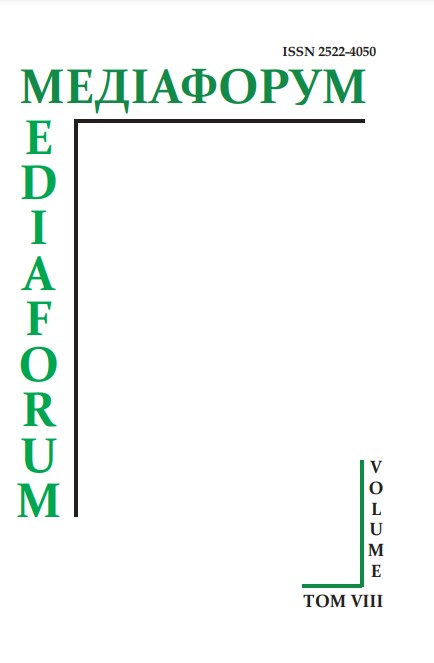Критика теорії рефлексивного модерну в сучасній політичній науці
DOI:
https://doi.org/10.31861/mediaforum.2020.8.132-147Ключові слова:
політична наука, політична теорія, теорія рефлексивного модерна, критика, множинний модернАнотація
У статті здійснено вивчення основних векторів критики теорії рефлексивного модерну. Доведено, що в сучасній політичній науці вона розгортається довкола окремих положень теорії рефлексивного модерну. Встановлено, що критики зазнає європоцентризм визначення та тлумачення рефлексивного модерну, характерний для досліджень
У. Бека, Е. Гідденса та Ю. Габермаса. Критичне ставлення до європоцентризму рефлексивного модерну спровокувало поширення ідеї про імовірність і реальність множинності модернів (наприклад, азійські концепції стислої модерності та посиленої модернізації). Обґрунтовано, що найважливішими векторами критики теорії рефлексивного модерну є: (1) роль та функції політичного часу та хронополітики в умовах різних культур та політичних систем; (2) функціональні характеристики суб’єктів політики, насамперед держави та громадянина; (3) наукова позиція, відповідно до якої політичне та політика в рамках реалій рефлексивного модерну не можуть залишатися у сталому вигляді, тож неминуче виявлення нових інституційних характеристик модерну, що суттєво розширюють уявлення про радикальний модерн; (4) необхідність уточнення такої характерної риси рефлексивного модерну як зміна системи контролю над засобами насильства; (5) пошук меж застосування теорії рефлексивного модерну в дослідженні політичних процесів в сучасному світі.
Завантажити
Посилання
Allard, E. 2002. “Somnitel`ny`e dostoinstva konczepczii modernizaczii”. http://2001.isras.ru/SocIs/SocIsArticles/2002_09/Allard.doc (accessed 10 June19).
Filippov, A. F. 2001. “Pechal`naya globalizacziya: lokal`noe bez granicz, global`noe bez mesta”. V: Bek U. Chto takoe globalizacziya? Moskva: Progress-Tradicziya. S. 283–297.
Beck, U. 2009. “Critical Theory of World Risk Society: A Cosmopolitan Vision” https://www.e-skop.com/images/UserFiles/Documents/Editor/urlich-beck-cosmopolitan-view.pdf
Beck, Ulrich. 2000. “Risk Society Revised: Theory, Politics and Research Programmes”. In: The Risk Society and Beyond. London: Sage Publications: 211–229.
Beck, Ulrich and Grande, Edgar. 2010. “Varieties of second modernity: The cosmopolitan turn in social and political theory and research”. British Journal of Sociology 61(3): 409–442.
Chang, Kyung-Sup. 2010. South Korea under Compressed Modernity: Familial Political Economy of Transition. London: Routledge.
Medrano, J. D. (2003). Questioning Modernity: A Test of Giddens’s Beck’s and Inglehart’s Theories. CCSA-Past Papers. http://www.sscnet.ucla.edu/soc/groups/ccsa/medrano.pdf (accessed 14 April 19).
Fischer, F. 1998. “Ulrich Beck and the Politics of the Risk Society”.Organization and Environment. 11 (1): 111–115. http://proquest.umi.com/pqdweb?RQT=305&SQ=AUTHOR(Frank%20Fischer)&SMR=1&SAid=0&SAName=sa_menu&JSEnabled=1&TS=1028547696 (accessed 10 April 19).
Han, Sang-Jin. 2015. “Second-modern transformation in East Asia: An active dialogue with Ulrich Beck” Socio. 5: 45–64 http://journals.openedition.org/socio/1897 (accessed 10 April 19).
Han, Sang-Jin. 2012. Divided Nations and Transitional Justice: What Germany, Japan and South Korea can Teach the World. Boulder: Paradigm Publisher.
Han, Sang-Jin and Shim, Young-Hee. 2010. “Redefining second modernity for East Asia: A critical qssessment,” British Journal of Sociology. 61(3): 465–488.
Han, Sang-Jin. 1997. “The political economy and moral institutions: The formation of the middling grassroots in Korea”. Humboldt Journal of Social Relations. 23(1–2): 71–89.
Han, Sang-Jin. 1998. “The Korean path to modernization and risk society,” Korea Journal. 38(1): 5–27.
Han, Sang-Jin. 2013. “Tackling the global threat through the ‘tianxia gonsheng”. Hankyoreh (newspaper). December 2. http://english.hani.co.kr/ (accessed 10 June19).
Knodt, E. M. 1991.“Irony and the Discourse of Modernity”. Philosophy and Literature. 15(2): 356–357.
Lash, S. 1994. “Reflexivity and its Doubles: Structure, Aesthetics, Community”. In: Beck U., Giddens A., Lash S. Reflexive Modernization: Politics, Tradition and Aesthetic in the Modern Social Order. Cambridge: Polity Press. P. 56–109.
Lash, S. 2000. “Risk Culture” In: The Risk Society and Beyond. London: Sage Publications. P. 47–62.
Leccardi, C. 2008. “New biographies in the ‘risk society’? About future and planning”. Twenty-First Century Society. 3(2):119–129.
Leccardi, C. 2014. “Time of Society and Time of Experience: Multiple Times and Social Change” KronoScope 14(1):10-24.
Leiss, W. 1992. Review on Beck U. Risk Society: Towards the New Modernity. London: Sage. http://www.ualberta.ca/~cjscopy/articles/leiss.html (accessed 10 June19).
Levitas, R. 2000. “Discourses of Risk and Utopia”. In: The Risk Society and Beyond. London: Sage Publications. P. 198–210.
Lyons, K. 2006. “Golbalization and Social Work: International and Local Implications” British Journal of Social Work. 36(3):365–380.
McDonald, P. 2001. “Low fertility not politically sustainable”. Population Today. 29(6):3–8.
More, M. 2013. “The Philosophy of Transhumanism”. In: More, M., Vita-More, N. (eds.), The Transhumanist Reader: Classical and Contemporary Essays on the Science, Technology, and Philosophy of the Human Future. New York: John Wiley & Sons, Inc. P. 3–17.
Murphy, R. 1994. Rationality and Nature. A Sociological Inquiry into a Changing Relationship. Colorado: Westview Press.
Murphy, R. 1997. Sociology and Nature. Colorado: Westview Press.
Offe, C. 2009. “Governance: An ’empty signifier’?” Constellations. 16(4): 550–562.
Randeria, Sh. 2017. “Mobilizing law for solidarity” https://www.eurozine.com/mobilizing-law-for-solidarity-an-interview-with-shaliniranderia/?pdf (accessed 10 June19).
Rose, H. 2000. “Risk, Trust and Scepticism in the Age of the New Genetics”. In: The Risk Society and Beyond. Ljndon: Sage Publications.
Rusanen, T. 2002. “Challenging the Risk Society. The Case of Finland”. Science Communication. 24(2):198–208.
Rustin, M. 1994. “Incomplete Modernity: Ulrich Beck’s “Risk Society” [Recensio]”. Radical Philosophy. 67: 3–12.
Scott, A. 2000. “Risk Society or Angst Society? Two Views of Risk, Consciousness and Community”. In: The Risk Society and Beyond. London: Sage Publications. P. 33–46.
Susen, S. 2009. “Between Emancipation and Domination: Habermasian Reflections on the Empowerment and Disempowerment of the Human Subject”. The Warwick Journal of Philosophy 20: 80–110.
Tully, J. 1989. “Wittgenstein and Political Philosophy: Understanding Practices of Critical Reflection”. Political Theory 17(2):172–204.














